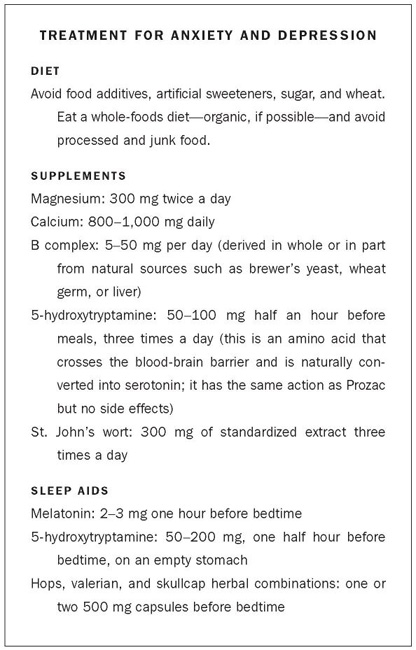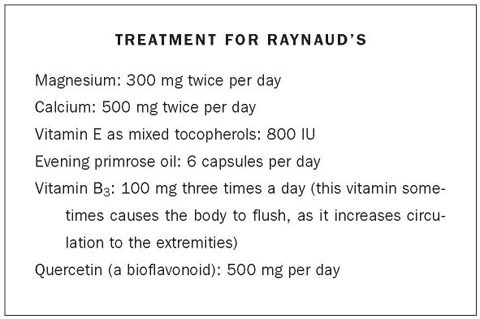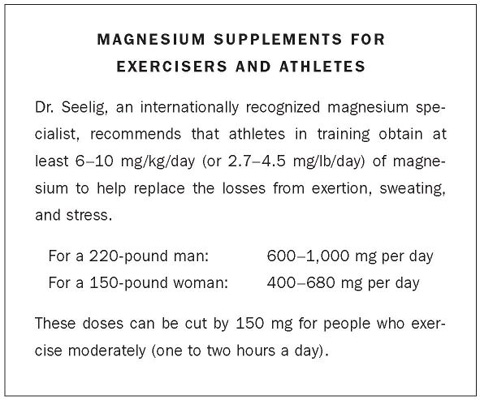CHAPTER 3
Anxiety, Pain, and Magnesium for Athletes
THREE THINGS YOU NEED TO KNOW ABOUT
MAGNESIUM, ANXIETY, AND DEPRESSION
Magnesium deficiency can produce symptoms of anxiety or depression, including muscle weakness, fatigue, eye twitches, insomnia, anorexia, apathy, apprehension, poor memory, confusion, anger, nervousness, and rapid pulse.
Serotonin, the “feel-good” brain chemical that is boosted by Prozac, depends on magnesium for its production and function.
Magnesium supports our adrenal glands, which are overworked by stress.
Each year millions of people are introduced to the merry-go-round of psychiatric drugs and psychological counseling for symptoms that may in fact be rooted in magnesium deficiency. Additional millions try unsuccessfully to cope with their problems by turning to alcohol, street drugs, and other addictive behavior to suppress their pain. We are a nation suffering a 32 percent incidence of anxiety, depression, and drug problems. Social epidemiologist Myrna Weissman at Columbia University reports that more and more Americans are becoming depressed, getting depressed at a younger age, and experiencing more severe and frequent periods of depression. Each generation born in the twentieth century has suffered more depression than the previous one, and since World War II the overall rate of depression has more than doubled.1,2 A recent study in the Archives of General Psychiatry showed a doubling of depression in women from 1970 to 1992, with the use of psychiatric drugs skyrocketing as a result. Children are not immune: American schoolchildren today are taking four times as many psychiatric medications as in all of the rest of the world combined.3
People do not get anxiety, panic attacks, or depression because they have a deficiency of Valium or Prozac. Our bodies do not require these substances for essential metabolic processes. However, we can develop a myriad of psychological symptoms because of a deficiency of magnesium, something our bodies do require. Does it make any sense to merely switch our addictions from sugar, alcohol, drugs, and cigarettes to prescription medication without looking at the possible underlying metabolic causes? Psychiatrists all too often rely on prescription drugs for suffering patients and have no insight into the metabolic functions of the mind and body and what happens when nutrients are deficient. Anxiety and depression are often nutrient deficiency diseases and chemical sensitivities, not drug deficiency diseases.
Darcy had driven across a mile-long bridge every day for years, so why one morning did she suddenly feel as though she would die if she didn’t pull over? She was sweating and her heart was pounding; she felt sick to her stomach and couldn’t get her breath. What was happening to her? Fortunately, she had her cell phone and called her best friend, Sara, who helped her calm herself and breathe her way across the bridge safely. Later, while talking with Sara to try to make sense of the episode, Darcy said she had been on a liquid protein diet for a few weeks. Sara pointed out that it could have thrown something out of balance, and she reminded Darcy that she had warned her of the dangers of this type of diet.
The two women reviewed the list of supplements that Darcy had been taking as part of the program and found that she had neglected to take the magnesium that had been suggested. Sara grabbed a natural health encyclopedia and, sure enough, magnesium deficiency was listed as one of the possible causes of panic attacks.
If Sara had read further, she would have found that the body demands more magnesium when on a liquid protein diet and that the dangers of such a diet have been documented for decades.4 By eating only protein, which has little magnesium, Darcy had set herself up for a terrifying attack. Fortunately, she discovered this before pursuing a prescription for a tranquilizer to deal with the frightening symptoms of panic attack.
Lack of magnesium may not have been the only cause of Darcy’s panic attack. Her high-protein diet could easily have led to hypoglycemia. When blood sugar (glucose) is low, the body reacts with a surge of adrenaline to bring glucose levels back to normal, in order to keep this essential nutrient fueling the brain. Adrenaline acts to speed the heart and retrieve glucose from liver storage. Sometimes people perceive a normal adrenaline rush as a panic attack. Interestingly enough, magnesium is also required for blood sugar control.
Women tend to pay attention to their feelings and interpret symptoms such as panic attacks as signs of emotional imbalance, for which they seek support. The support they get, however, is often in the form of a prescription for an antianxiety drug instead of sound advice to eat a better diet, exercise, and take the right balance of supplements.
Magnesium deficiency can be an underlying cause of anxiety and depression, as determined in several clinical trials.5 Symptoms of chronic magnesium deficiency include anxious behavior, hyperemotionality, apathy, apprehension, poor memory, confusion, anger, nervousness, muscle weakness, fatigue, headaches, insomnia, light-headedness, dizziness, nervous fits, the feeling of a lump in the throat, impaired breathing, muscle cramps (including leg cramps), a tingling or pricking or creeping feeling on the skin, rapid pulse, chest pain, palpitations, and abnormal heart rhythm. 6,7
ANXIETY
Stress is so prevalent in our daily life that we have become desensitized to it and the message it is trying to give us, which is to slow down. Anxiety is a chemical reaction created when the adrenal glands respond to a stressful event, such as low blood sugar, by releasing adrenaline. Adrenaline is very useful if you’re trying to escape from a dangerous situation, because it gives you that fight-or-flight response: the heart starts pumping faster; digestion slows down; energy stores are released from the liver and made available to the heart, lungs, and muscles; and the muscles of the arms and legs are activated. All of these responses require magnesium. So each time we experience any kind of stress, our magnesium stores are tapped to create energy. This magnesium depletion itself stresses the body, which can result in panic attacks, which equals yet more stress. Not only do our overworked adrenals cause magnesium depletion, but even more adrenaline is released under stress when magnesium levels are low in the body, leaving people feeling irritable, nervous, edgy, or even ready to explode. It’s the proverbial catch-22. 8 To put an end to anxiety, magnesium needs to be replaced.
During stress reactions, calcium is also required to stimulate the release of adrenaline. A calcium excess, however, causes a flood of adrenaline. Sufficient magnesium will buffer excess calcium and keep it within normal levels, limiting the stress response. Magnesium is important because it naturally diminishes the excitability of the nervous system and lowers the level of calcium around nerve cells. This function of magnesium is also significant in heart disease and other stress-induced illness.9,10
CHRONIC STRESS
According to Hans Selye, the Canadian doctor famous for his work on stress in the 1960s, magnesium is also depleted when the body shifts from a short-term fight-orflight reaction to a chronic stress reaction. The adrenal glands produce cortisol, a type of cortisone, and another stress hormone, norepinephrine, that acts like adrenaline and also causes magnesium depletion.
Chronic stress can come from feeling insecure and threatened, or from exposure to toxic chemicals, heavy metals, or even loud noise, which assaults the nervous system and overworks the immune system. For example, constant loud noise in an industrial work setting induced a significant increase of total serum magnesium (as magnesium was released from tissues) and significantly increased urinary excretion of magnesium, indicating a magnesium deficiency, which lasted for forty-eight hours after exposure. 11
MAGNESIUM-DEFICIENT KIDS
It’s not just adults who can get anxious because of magnesium-deficient diets. Our children are also susceptible when their favorite foods are magnesium-deficient hot dogs, pizza, and soda. The stress in their lives—from peer pressure, academic and athletic performance pressures, worries about body image, the changes and hormonal fluctuations of puberty, exposure to negative events and violence through the media—also contributes. Children are underdiagnosed when it comes to magnesium deficiency, but can have magnesium deficiencies for the same reasons as adults. Attention deficit hyperactivity disorder (ADHD), juvenile delinquency, and childhood depression are associated with magnesium deficiency, and some say these conditions can be caused by it. 12 Instead of reaching for Ritalin or Prozac for kids, consider whether they’re getting enough magnesium first.
Dr. Leo Galland, author of Superimmunity for Kids, speculates that hyperactive children need extra magnesium due to their constantly high adrenaline levels. Dr. Galland recommends 6 mg per pound of weight per day (for example, 240 mg for a 40-pound child). Because magnesium is hard to find in a form suitable for young children, he suggests 1 tbsp of magnesium citrate a day or 1½ tsp of milk of magnesia a day. These are both laxatives in much larger doses, but in such small doses they supply the necessary magnesium without a laxative effect.13
SEROTONIN, MAGNESIUM, AND DEPRESSION
You may be familiar with serotonin, the body’s natural “feel-good” brain chemical. Magnesium is important in the serotonin story because it is a necessary contributor for release and the uptake of serotonin by brain cells. With proper amounts of magnesium, nature makes sufficient serotonin and you experience emotional balance. But when stress depletes magnesium, a vicious cycle spins out of control, and depression can occur. The body needs magnesium in order to release and bind adequate amounts of serotonin in the brain.
The pharmaceutical industry has focused its research for the treatment of depression on selective serotonin reuptake inhibitors (SSRIs) such as Prozac to capitalize on serotonin’s chemical effects instead of giving serotonin what it really needs—magnesium. SSRIs create artificially elevated levels of serotonin in the body by preventing its breakdown and elimination; serotonin lingers longer in the brain and theoretically causes mood elevation. This is what is supposed to happen, but everyone has a different reaction to the manipulation of their brain chemicals. For some people, prolonged, rising levels of serotonin can liberate them from a long depression. For others, the drug can lead to anxiety and irritability. Another group of people tend to have flattened moods in which they can neither weep nor laugh, keeping them from the extremes of depression or mania but relegating them to a one-dimensional life.
This was Maggie’s situation. She was on Prozac and desperately trying to come off it because she was unable to cry or experience real emotions. Maggie was down to one-quarter of a tablet but was afraid to stop in case her depression came back. She also had high blood pressure, high cholesterol, periodic muscle cramps, and constipation. I asked her to have her magnesium tested, and her cardiologist said it was normal; he said she didn’t need magnesium but should continue to take her five prescription medications to control her symptoms. She called me when her G.P. thought her muscle cramps were a major blood clot in the leg. We didn’t have time to ship a blood sample to the lab that performs ionized magnesium testing, so I encouraged her to take 300 mg of magnesium twice a day and go for a Doppler scan to rule out blood clots. Fortunately, the scan was negative, so Maggie was able to avoid several more medications to treat blood clots, and the magnesium was already working to relieve her symptoms. Within two weeks Maggie was also off the Prozac and able to cry again.


Because depression can be so debilitating, even life-threatening, I understand why doctors feel it requires strong measures to combat it, but these strong measures don’t always work. The alternative that many doctors are missing is the nutrient connection. Magnesium deficiency is a potential cause for every type of depression. All treatment protocols should begin with adequate doses of this valuable mineral.14
RAYNAUD’S SYNDROME
Sally had terrible leg cramps. During the night, her legs felt jumpy and twitchy and kept her awake. If she did fall asleep, muscle cramps in her calf would wake her up. In addition her fingers began turning white, blue, and red. A young internist diagnosed her as having Raynaud’s syndrome, a circulatory condition caused by the spasm of tiny arteries, especially in the hands and feet.
Raynaud’s syndrome may occur suddenly or as a result of other chronic illnesses such as connective tissue disease, trauma, or pulmonary hypertension, in which cases it is called Raynaud’s phenomenon. Raynaud’s syndrome is seen mostly in young women and rarely leads to damage of the extremities. Cold is often the only stimulus that initiates the blood vessel spasms, which may last from minutes to hours. Emotional stress can also play a role in bringing on an attack. Besides the noted color changes there can be agonizing pain, especially when the fingers are rewarming. Symptoms of tingling, numbness, and burning are common. Many people who have this condition just put up with it. Even if they consult their doctors for a diagnosis, there is no safe, effective drug treatment for it (sometimes calcium channel blockers are used).
Fortunately, Sally’s internist knew that magnesium is the most effective treatment for both muscle cramps and Raynaud’s because it improves circulation, stops spasms, and minimizes stress reactions. He put her on magnesium, 300 mg twice a day, and a daily multiple vitamin and mineral; after two months he added calcium, 500 mg twice a day.
It took three months for the Raynaud’s to respond, but Sally couldn’t believe how good she felt in the meantime. The muscle cramps improved within a week, and symptoms that she had thought were just part of getting old dramatically improved. Her energy increased as she was able to sleep better. Her bowel movements were also more regular, and she was much calmer than she had been in a long time.
Nutritional recommendations for Raynaud’s include liver-cleansing foods such as beets, dandelion greens, burdock root, and lemons, and foods rich in magnesium, including nuts, seeds, green vegetables, and whole grains. Foods to avoid or reduce to lessen the symptoms of Raynaud’s syndrome include meat, alcohol, spices, and fatty, rich, fried, or salty foods.

MAGNESIUM AND MUSCLE PAIN
A patient came for a consultation and wanted a total body X ray because she was having such severe episodes of pain— her whole body would go into spasm—that she thought she must have cancer. I asked her to try taking 300 mg of magnesium three times a day. Within three days she no longer had the spasms, and after three weeks she was free of pain.
THREE THINGS YOU NEED TO KNOW ABOUT MAGNESIUM AND MUSCLE PAIN
Magnesium helps muscles relax.
Magnesium eliminates spasms.
Magnesium relaxes blood vessels in the fingers to treat Raynaud’s syndrome.
Although this patient did not have cancer, research has shown that even the pain of cancer can respond to magnesium. Cancer sometimes metastasizes into nerve bundles located in the neck or lower back and may not respond to even the strongest analgesics such as morphine. There is a special receptor site called NMDA that is responsible for creating this type of nerve pain; magnesium blocks this receptor. In cases of severe pain, intravenous magnesium has shown very powerful analgesic effects.15
MAGNESIUM AND EXERCISE
Cells use energy packets called ATP (adenosine triphosphate), which are formed under the influence of magnesium. Some of the first studies showing the relationship between magnesium and physical performance were done on animals and found that decreased exercise capacity can be an early sign of magnesium deficiency. When the animals were given
THREE THINGS YOU NEED TO KNOW ABOUT MAGNESIUM AND EXERCISE
Magnesium reduces lactic acid, which causes post-exercise pain.
Magnesium is lost during exercise.
Magnesium deficiency may cause sudden cardiac death in healthy athletes.
magnesium dissolved in water, their endurance was restored. Most human studies also confirm that both brief and extended exercise deplete magnesium.
One of the most amazing effects of magnesium on the neuromuscular system is that it provides more energy, even though the mineral generally acts as a relaxant and not a stimulant. If you are magnesium-deficient, your energy level will be low because you aren’t producing the necessary energy to run your body. When you start taking magnesium, your energy level goes up. Magnesium’s interactions with calcium help keep calcium from causing excessive muscle contraction. Excess calcium causes tension and tightness in all the muscles of the body, but when you take a balancing amount of magnesium, this tension releases within hours, days, or weeks, depending on the underlying level of magnesium deficiency in your body.
Exercise is often prescribed therapeutically for anxiety and depression—to burn off steam (so to speak), to increase the circulation, and to get adrenaline pumping. Magnesium allows the body to burn fuel and create energy in an efficient cycle during exercise that does not lead to lactic acid production and buildup. For some individuals who exercise excessively or suffer from chronic fatigue syndrome, painful amounts of lactic acid build up in their muscles making exercise an unpleasant experience. Exercise itself places stress on your body, to which your adrenal glands respond by pumping out adrenaline, which interacts and binds to cell membranes in the presence of adequate magnesium.
Heavy exercisers, especially long-distance runners, can build up lactic acid and suffer shin splints and painful muscles, but they keep on running because they may be addicted to the adrenaline rush they get when they reach “the wall” in their workout. The wall feels like something you just can’t break through, but you keep on pushing, and suddenly you get a burst of adrenaline and you’re flying. That’s the power of your adrenal glands when pushed to the maximum. Yet that stress-induced high is followed by a crash, when you don’t repair the damage to your adrenal glands with good nutrition and restore the magnesium that was lost during exercise.
Many studies have shown that magnesium supplementation enhances the performance and endurance of long-distance runners, cross-country skiers, cyclists, and swimmers. It also reduces lactic acid buildup and postexercise cramps and pain. Since athletes undergo severe physical stress as well as the psychological drive to win, and most ingest suboptimal amounts of magnesium, they are vulnerable to magnesium deficiency.16
Years ago the coach of a Florida high school football team was concerned about his players’ frequent complaints of leg cramps, so he gave them a calcium supplement on a very hot day before a rigorous game. Early in the second half, eleven players became disoriented and had difficulty walking. Their speech was slurred, they complained of muscle spasms, and they were breathing very deeply. Within an hour, eight of the boys collapsed into full-blown seizures; two had repeated seizures. Those having the worst symptoms had been playing the hardest. Thirteen more players reported headaches, blurred vision, muscle twitching, nausea, and weakness.17 Eventually all the boys recovered, but what happened to create such a frightening scene in this group of healthy young men? Consider the facts. Those that were affected had all eaten a pre-game magnesiumdeficient fast-food meal consisting mainly of carbohydrates and fats, and sodas containing phosphoric acid. With the increased magnesium loss from excessive sweating plus the calcium supplement, their magnesium stores had been driven dangerously low.18
Magnesium deficiency may also play a role in sudden cardiac death syndrome, which can affect athletes.19 In a study of young, healthy, well-conditioned men, strenuous effort was reported to give rise to persistent magnesium deficiency and a related long-term increase in cholesterol, triglycerides, and blood sugar. This study postulates that the sudden death of athletes and other intensely training individuals during extreme exertion is triggered by the detrimental effects of persistent magnesium deficiency on the cardiovascular system.20,21
